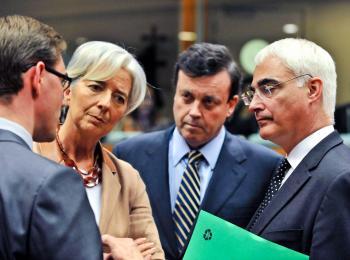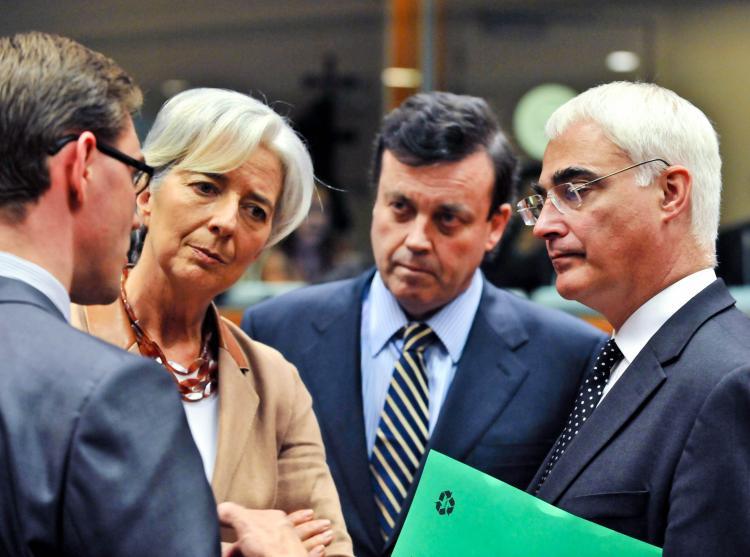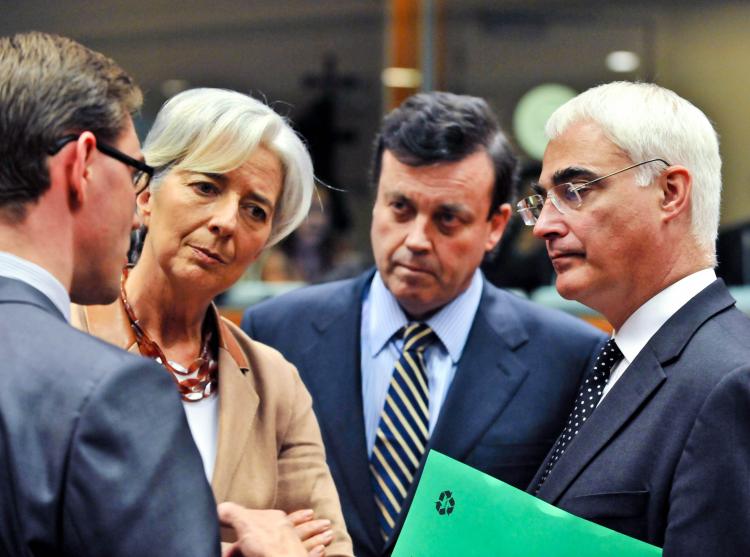EU finance ministers pledged to set up a stabilization mechanism to defend member countries against “speculative” attacks by the financial markets, and to prevent Greece’s situation from spreading.
According to Spanish Finance Minister Elena Salgado, EU ministers are determined to safeguard the currency used by 16 of the 27 EU member states, AFP reported.
France and Germany, the two largest eurozone members, agreed on measures to resolve the European financial crisis, according to a statement from French President Nicolas Sarkozy’s office on Sunday.
Ministers were striving to have measures approved by the time stock markets opened Monday as traders have been selling the euro off, even after approving Greece bailout funds and after EU leaders insisted that the same fate will not meet other European countries.
Over the weekend eurozone leaders decided to set up a new fund that is expected to provide $90.2 billion (70 billion euros) to the 16 EU member states to deal with the most serious crisis in the euro’s history, mainly caused by high interest rates.
According to Herman Van Rompuy, president of the European Council, eurozone members are facing exceptional circumstances. He stressed that all EU institutions, including the European Central Bank, agreed to use the “full range of measures available” to ensure the stability of the eurozone.
“The important point common to all these agreed elements today is that we will defend the euro whatever it takes,” European Commission Head Barroso declared in a statement before the eurozone leaders.
Barroso stressed the importance of a “deeper fiscal consolidation” of Europe that he called a “consolidation pact.”
The European Commission chair also highlighted the lines along which eurozone members have united: better economic coordination with the help of the European stabilization mechanism to preserve financial stability in Europe; reinforcement of budgetary surveillance and increasing economic policy coordination; and urgent completion of financial market reforms.
Eurozone leaders agreed to take rapid steps to defend the euro from speculative attacks and to restore long-term investors’ confidence in the EU currency. This happens amid fears that the debt problems of Greece, which forced the country to seek assistance from the EU and from the International Monetary Fund, are possible in Portugal and Spain.
According to Spanish Finance Minister Elena Salgado, EU ministers are determined to safeguard the currency used by 16 of the 27 EU member states, AFP reported.
France and Germany, the two largest eurozone members, agreed on measures to resolve the European financial crisis, according to a statement from French President Nicolas Sarkozy’s office on Sunday.
Ministers were striving to have measures approved by the time stock markets opened Monday as traders have been selling the euro off, even after approving Greece bailout funds and after EU leaders insisted that the same fate will not meet other European countries.
Over the weekend eurozone leaders decided to set up a new fund that is expected to provide $90.2 billion (70 billion euros) to the 16 EU member states to deal with the most serious crisis in the euro’s history, mainly caused by high interest rates.
According to Herman Van Rompuy, president of the European Council, eurozone members are facing exceptional circumstances. He stressed that all EU institutions, including the European Central Bank, agreed to use the “full range of measures available” to ensure the stability of the eurozone.
“The important point common to all these agreed elements today is that we will defend the euro whatever it takes,” European Commission Head Barroso declared in a statement before the eurozone leaders.
Barroso stressed the importance of a “deeper fiscal consolidation” of Europe that he called a “consolidation pact.”
The European Commission chair also highlighted the lines along which eurozone members have united: better economic coordination with the help of the European stabilization mechanism to preserve financial stability in Europe; reinforcement of budgetary surveillance and increasing economic policy coordination; and urgent completion of financial market reforms.
Eurozone leaders agreed to take rapid steps to defend the euro from speculative attacks and to restore long-term investors’ confidence in the EU currency. This happens amid fears that the debt problems of Greece, which forced the country to seek assistance from the EU and from the International Monetary Fund, are possible in Portugal and Spain.







